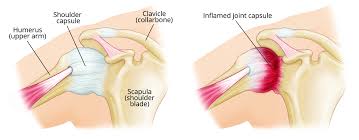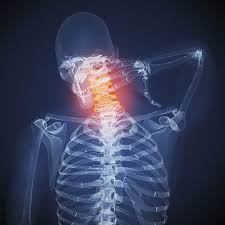What is Frozen Shoulder? What are its causes? How can you I cure it? So, guys, you will get the answers to all your questions in my blog. As you all must be aware that this condition is getting very common these days. Every 10th of the patient coming to me is suffering from frozen shoulder. What do I see? Most of them are women and that too between the age of 45- 60 years. Why is it so? Why its more common in females as compared to males of the same age group? It may be because of the overuse of their shoulder in all the household chores especially the women in India. The exact reason for its occurrence is still unknown.
Adhesive Capsulitis is the other name for frozen shoulder. The shoulder capsule gets thickens, gets stiff thus causing pain and reducing the mobility of the shoulder joint. It affects mostly the one shoulder but in some cases, both the shoulders get involved.
What are the causes of frozen shoulder?
The exact cause is unknown i.e. there are no as such precipitating factors for this condition. It mostly affects the women as compared to men. Also, patients suffering from diabetes are at high risk.
It can also develop after shoulder immobilization in case of fractures, surgeries, dislocation of shoulder etc.
It often occurs in other medical problems like stroke, hypothyroidism, hyperthyroidism, cardiac diseases and, sometimes after cervical spondylosis.
What are its symptoms?
- Dull, aching and diffuse pain in and around the shoulder joint and sometimes in the upper arm. It worsens mostly at night when the patient tries to sleep on the affected side.
- Stiffness
- The patient is unable to lift the arm up completely, unable to do combing.
- Difficulty in changing clothes and putting the hand in back pocket.
- Symptoms last from a few months to 2-3 years. It consists of 3 stages-
Freezing stage- Shoulder movement causes pain and range of motion get limited. Pain increases gradually in this stage. It lasts from 6 weeks to 9 months.
Frozen stage- Though pain gets diminished in this stage but shoulder becomes stiffer thus limiting shoulder range of motion. It lasts for 4 to 6 months.
Thawing stage- Shoulder range of motion gets improved and pain fades away. It takes 6 months to 2 years.
 |
| Difficulty combing |
What is the Treatment For Frozen shoulder?
1. Painkillers:
NSAIDs, like ibuprofen, Adrin, Paracetamol etc. helps to reduce pain and swelling.
2. Steroid Injection:
Cortisone, a steroid hormone is injected into the shoulder joint to alleviate pain and swelling. But its repeated use is discouraged as it causes further damage to the shoulder.
3. Physiotherapy:
Various modalities like Hot packs, Cold Packs, TENS, IFT, US etc. can be used to reduce pain and swelling. Ultrasonic(US)therapy given at a tender point to decrease the pain. Also, passive mobilization by physiotherapist helps in increasing the range of motion of the shoulder. Stretching and strengthening exercises gives a better result. Few other techniques like an active assisted range of motion, an active resisted range of motion, home exercises help in increasing the flexibility of the joint.
To know more about self-exercises read my next blog.
Source:frozen-shoulder-exercises
4. Surgical Treatment
Shoulder arthroscopy can be used in rare cases to remove the adhesions by inserting a small endoscope through a small incision. Also, joint manipulation is performed by a surgeon under anesthesia to move the shoulder joint.
Source:
patient.info/health/frozen-shoulder-leaflet




















